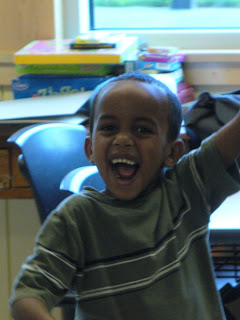On Wednesday, November 28th, Refugee Resettlement’s
own Brendon Robar was the featured speaker at Catholic Charities Donor Recognition
Luncheon. As a Case Manager, Brendon has
worked with refugees from all over the world, including Iraq, Iran, Burma,
Bhutan, Eritrea, Ethiopia, the Sudan, the Democratic Republic of the Congo, and
Somalia. Below is the text of his talk,
describing how a recent arrival, a refugee from Iraq, needed and received care
for a serious medical condition.
I began working with the Catholic
Charities Refugee Resettlement team 5 years ago as the donation coordinator. In
that role I may have actually picked up furniture donations from some of you.
Almost 3 years ago, I began working as a case manager. In this role I work with
our refugee clients for a full 8 months, and sometimes longer. This gives me
the blessing of getting to know them better. And I also get to do a whole lot
more paperwork!
Refugee Resettlement officially
began in 1951, when the United Nations High Commissioner for Refugees
established the definition of a refugee, which is someone who "is outside
the country of his nationality because of a well-founded fear of being
persecuted because of race, religion, nationality, or political opinion, and is
unable
to return to his country." That's a complicated way of saying that
refugees are regular people who decided it was better to pack what they could
carry on their backs and leave their own country than to risk what might happen
to them if they stayed. It's hard to imagine a situation bad enough to force
people to leave not just their homes and cities—but their countries! All the
refugees we work with at Catholic Charities have their own reasons for why they
left, but I'd like to share one story of a refugee who arrived to Portland
three months ago.
Allow me to introduce you to
Samer Ibrahim. Samer and I were actually born in the same year—but on opposite
sides of the world. Samer was born in Iraq. Samer was also born with
Hemophilia, a rare genetic disorder that prevents his blood from clotting. If
Samer cuts himself a band-aid won't fix it. Like most people with Hemophilia,
Samer didn't know he was different from any other kid until he was about 4 years
old and had his first skinned knee. In Iraq, Samer couldn't get the specific
medical care that's needed to treat Hemophilia. Without medication, his knee
continued to bleed internally from that first playground accident destroying
the cartilage and ligaments that hold the knee together.
If Hemophilia without medication
wasn't bad enough, Samer lived in Bagdad. I've heard stories from people
out of Bagdad that are surreal. A note is left on your door: it's a death
threat from some militant faction. The note says you are friends with someone
who is helping the US Army, and they will kill you and your family because of
it. You may have a coworker who leaves from work to get lunch but never
returns. Days later, his body is found on the side of the road. People can only
take so much of this before they decide it's better to become a refugee. This
tipping point came sooner for Samer than for others because of his Hemophilia.
Samer fled Iraq when he was only twenty years old leaving his two brothers,
sister and his parents behind. Many people fled Iraq because of war, but Samer
might be the only refugee who fled because of war and Hemophilia. Samer had two
reasons to flee, and so he has twice the hope for his new life.
Samer fled Iraq and made it to
Lebanon where he was first scrutinized by the FBI, the Department of
Homeland Security, and the CIA to make sure he wasn't a terrorist. Then, he
attended cultural orientation sessions, had several medical screenings and
signed a promissory note acknowledging that his airfare is a loan. Finally,
Samer boarded an airplane for Portland, Oregon. When I saw Samer walk off
the airplane here in Portland, the pain from his knees was visible on his face.
When refugees arrive with serious
medical conditions, we know beforehand so we can prepare. I called the clinic
and was given instructions on what we needed to do from day one to care for
Samer. Less than 24 hours after Samer landed in the US, we had an appointment
at OHSU where he got that specific medication he couldn’t get his whole life in
Iraq. Samer is not yet 30, but the
doctors tell him he has the knees of someone in his 90’s.
Within a few weeks Samer had
a consultation at OHSU to see if he is a candidate for knee replacement
surgery. In my car after the
appointment, Samer told me that this knee surgery is his dream. It’s wonderful when we get to see the hope
that our clients bring with them fulfilled; and in Samer’s case it’s all
happening so quickly! Samer will have
knee replacement surgery within the next two months!
I want to thank you for giving to
the work of Catholic Charities. Because of you, Catholic Charities helps almost
300 refugees every year to resettle in Portland. It’s a privilege to join together with you to
welcome the stranger to our table, as Jesus welcomes us.

















